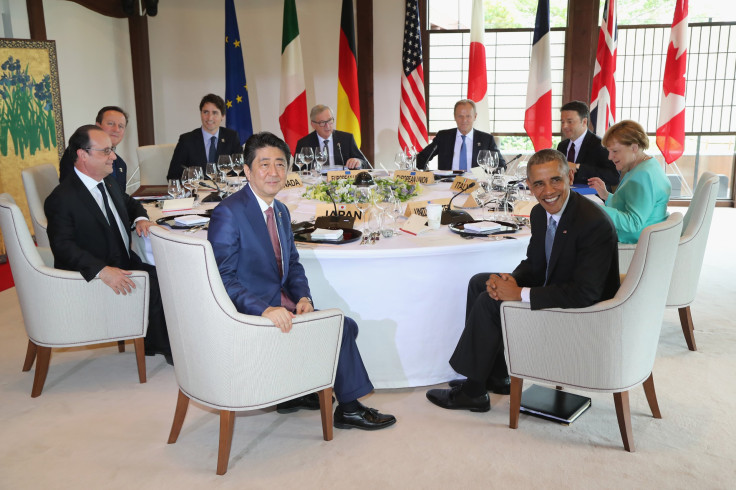G7 Summit 2016: Global Economic Risks Dominate Agenda As Shinzo Abe Compares Conditions To Financial Crisis

Leaders of the G-7 nations on Thursday voiced their concerns over the state of the world’s economy, with Japanese Prime Minister Shinzo Abe going so far as to say that current global economic conditions were comparable to those in the aftermath of the 2008 financial crisis, when the investment banking behemoth Lehman Brothers collapsed in the U.S.
“G-7 leaders voiced the view that emerging economies are in a severe situation, although there were views that the current economic situation is not a crisis,” Japan’s deputy chief cabinet secretary Hiroshige Seko reportedly said Thursday. “There is a concern that the sluggish economy might last some time, and that Abe hopes to share a common notion about the potential risks.”
The two-day annual summit, which kicked off in Ise-Shima Thursday, brought together leaders from the U.K., Canada, France, Germany, Italy, Japan and the United States. The meeting comes at a time when economies across the globe are still struggling to recover from the sharp slowdown in China that has cooled demand, and the plunge in oil prices and commodities.
Japan’s export-dominated economy, which was already reeling under years of deflation, has been the hardest-hit. The country’s central bank now expects Japan’s economy to grow at a measly pace of 1.2 percent in the fiscal year 2016.
In recent weeks, as the country's economy continues to struggle with weak consumption and sluggish exports, many in Japan have voiced the possibility that the government may intervene in the currency markets to arrest the yen’s appreciation — an issue that pits it against the U.S. and most European nations.
“So far we have discussed issues of the global economy and the need to continue to accelerate growth,” U.S. President Barack Obama said during a press conference at the summit. “[We] emphasized the importance of pushing back against either protectionism or competitive currency devaluations or the kinds of beggar-thy-neighbor strategies that all too often lead to everyone being worse off.”

Japan, Germany and the U.K. are also divided over the need for fiscal stimulus. While Abe has urged world leaders to adopt a flexible fiscal policy to boost global growth, the European nations have resisted calls for fiscal stimulus.
Although discussions about the health of the global economy will top the agenda, other issues, including cyber and maritime security, the rising threat of terrorism, and Europe’s refugee crisis will also figure in the discussions.
“Honestly speaking, if they (the G-7) don't take the lead in managing this [refugee] crisis, nobody else will. I will appeal to G-7 leaders to take up this challenge,” European Council President Donald Tusk said Thursday.
© Copyright IBTimes 2025. All rights reserved.






















